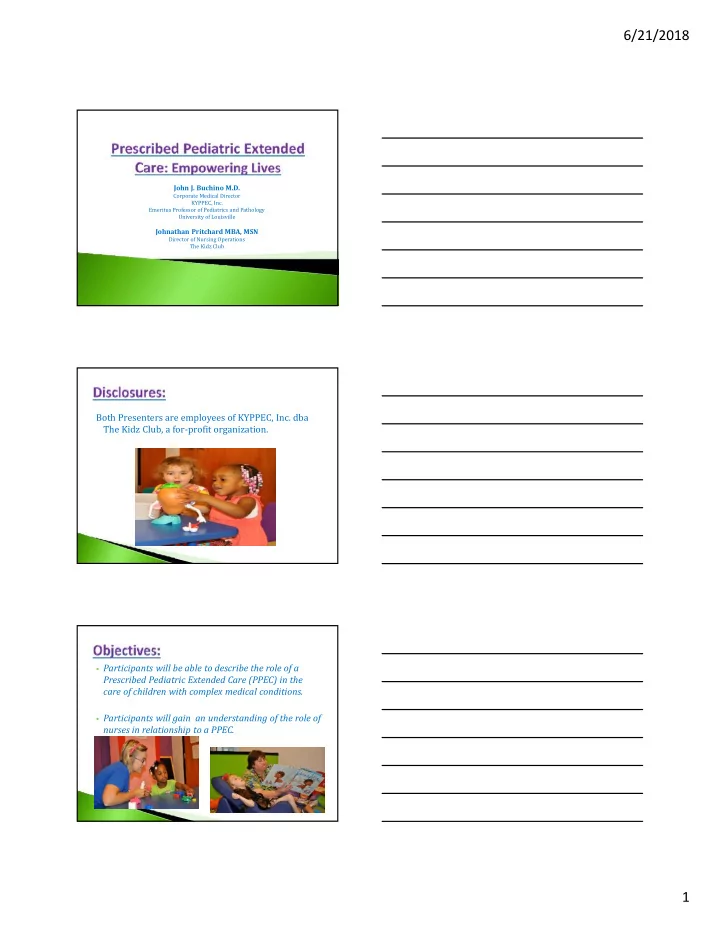

6/21/2018 John J. Buchino M.D. Corporate Medical Director KYPPEC, Inc. Emeritus Professor of Pediatrics and Pathology University of Louisville Johnathan Pritchard MBA, MSN Director of Nursing Operations The Kidz Club Both Presenters are employees of KYPPEC, Inc. dba The Kidz Club, a for-profit organization. Participants will be able to describe the role of a Prescribed Pediatric Extended Care (PPEC) in the care of children with complex medical conditions. Participants will gain an understanding of the role of nurses in relationship to a PPEC. 1
6/21/2018 What does a family with limited resources do for daycare for a child with a complex medical condition? PPEC PPEC (Prescribed Pediatric Extended Care) is a non-residential health care service that provides an important link in the continuum of care for medically or technology dependent children. The PPEC center provides the following triad of necessary services for dependent children and their parents: day health care, developmental interventions, and parental training. (http://www.lrc.state.KY.us/KAR/902/020/280.htm ) 2
6/21/2018 1988 Delaware and Florida enact legislation establishing PPECs under Medicaid program (Adopted by State Boards of Health Feb 1989 effective both states in Mar 89) 1989 Kentucky enacts similar legislation thanks to Vicki Whitehead, RN and Carol Martin, ARNP (Adopted 1990) 2018 Florida over 20 organizations with over 60 centers 2018 Delaware has 2 organizations with 3 centers Kentucky 4 organizations with 9 centers 3
6/21/2018 Technological Dependence Requiring “Skilled Nursing” Examples Any child with a chronic physical medical condition that prevents the child from attending a normal daycare center. Mental health issues do not qualify This is not “drop-in” care This is not respite care 4
6/21/2018 Child must have qualifying condition Staffing Requirements Pediatrician Medical Director Parental Education Component Parents working or attending school Access to ancillary therapies 2 year-old girl 3-4 tonic/clonic seizures per day at 4 months of age Parents reported developmental regression Multiple EEGs revealed Hypsarrythmia Diagnosed with refractory idiopathic infantile spasms and developmental delays Treated with prednisone, Sabril, ACTH with little effect At 1 year, child needed support to sit, could not crawl, pull up, or stand PPEC nursing care consisted of : Head to toe daily assessment BID neurological assessments Ketogenic diet (test for ketones q 2 weeks) Therapy through First Steps (KY early intervention) with follow through therapies by PPEC staff Consistent medication regime Case management (link between primary, specialists, insurance provider) Education for parents via phone and face-to-face 5
6/21/2018 Child still has intermittent seizures/spasms Child has improved mostly with gross motor development Crawling in quadraped position Consistently pulling up to stand Tolerating increasing time in gait trainer Crawling onto and over furniture One month hospitalization at birth Premature infant at 36 weeks gestation Fetal alcohol Syndrome and NAS Difficulty feeding requiring G-tube placement Hepatitis C exposure in utero Aunt given custody due to mother’s inability to care for child Guardian very concerned for her own ability to care for the child (young, no children of her own, full- time job, no family support) Made aware of PPEC services by case worker Guardian began enrollment process PPEC nurses performed initial assessment in the hospital Plan of treatment created 6
6/21/2018 All parties (primary physician, case worker, nurses, guardian) on board with plan Guardian is able to continue her full-time employment Education is provided at guardian’s request or when intervention is needed 4 years old Chronic Respiratory Disease Epilepsy Dependence on Respirator [Ventilator] Status 7
6/21/2018 VIDEO Receives medications as prescribed Receives follow-up therapies as prescribed Socialization with other children and adults Nutritional needs met Across classes, 20% - 35% loss in patient base after fill of initial prescription 100% Multiple Sclerosis 90% (Biologic) Patients Continuing Therapy (%) 80% High Cholesterol (Statin) 70% Hypertension 60% (CCB) 50% Osteoporosis (SERM) 40% Depression 30% (SSRI) 20% Asthma (Inhaled Steroid) 10% 1 2 3 4 5 6 7 8 9 10 11 Months of Therapy CCB = calcium channel blocker; SERM = selective estrogen receptor modulator; SSRI = selective serotonin reuptake inhibitor. Vanelli MR et al. Moving beyond market share. In: In Vivo: The Business and Medicine Report. 2002:1-6. 8
6/21/2018 Receives medications as prescribed Receives follow-up therapies as prescribed Socialization with other children and adults Nutritional needs met Allows parents to work or attend school Relieves some of the stress of caring for a child with a chronic illness Provides a means for education concerning the child’s illness and therapies 501 Kentucky families on roll ◦ 95% of parents work or attend school Erlanger 106 families 85 employed (80%) 17 students (16%) 4 disabled (4%) 9
6/21/2018 Allows parents to work or attend school Relieves some of the stress of caring for a child with a chronic illness Provides a means for education concerning the child’s illness and therapies Healthier children Working parents Improved family stability “Medical Home” benefit Financial ??? 10
6/21/2018 Pierce PM, Lester DG, Fraze DE. Prescribed pediatric extended care, the family centered health care alternative for medically and technology-dependent children. In: Hochstad NJ, Yost DM, eds. The Medically Complex Child: The Transition to Home Care. Chur, Switzerland: Harwood Academic Publishers; 1991: 177-190. Ruppert E, Host N. Out-of-Home Child Care and Medical Day Treatment Programs. In: Guidelines for Pediatric Home Health Care. Elk Grove Village, IL. American Academy of Pediatrics 2002: Chapter 34: 509-526. Harris JS. Infection control in Pediatric Extended Care Facilities. Infection Control and Hospital Epidemiology 2006; 27 (6): 598-603. (http://www.lrc.state.KY.us/KAR/902/020/280.htm ) (https://ahca. Myflorida.com/Medicaid/childhealthservices/ppec) 11
Recommend
More recommend